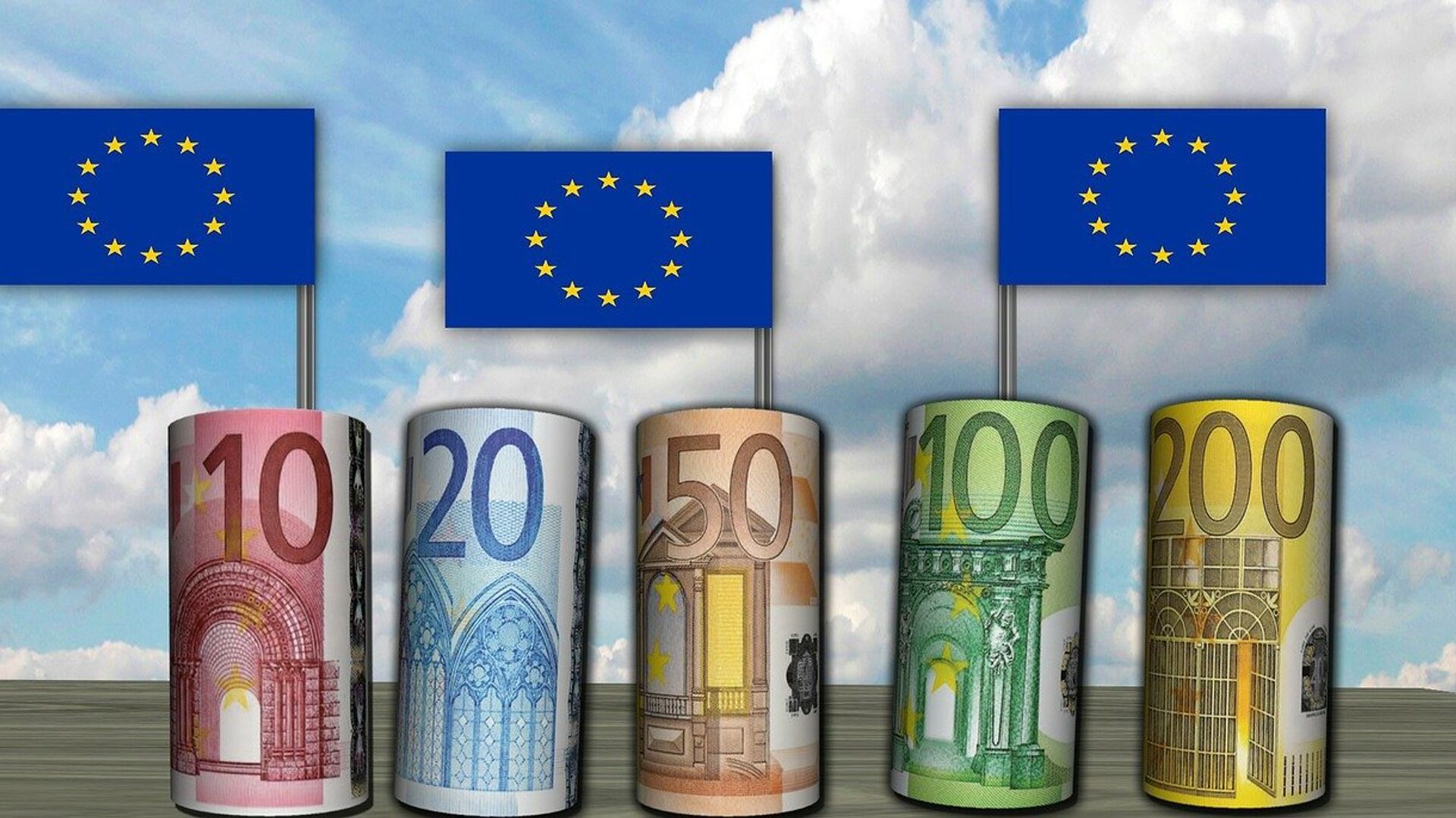https://sputnikglobe.com/20230724/eurozone-signposts-intensified-economic-decline-triggering-recession-fears-1112113188.html
Eurozone Signposts Intensified Economic Decline, Triggering Recession Fears
Eurozone Signposts Intensified Economic Decline, Triggering Recession Fears
Sputnik International
As HCOB Flash PMI survey data reveals a sharp fall in key indicators, calls for ECB to halt interest rate hikes grow amidst weakening business activity.
2023-07-24T17:57+0000
2023-07-24T17:57+0000
2023-09-01T12:55+0000
economy
hamburg
germany
france
the european central bank (ecb)
european central bank
pmi
capital economics
https://cdn1.img.sputnikglobe.com/img/103831/32/1038313230_30:0:1250:686_1920x0_80_0_0_5af1315f17033421bcff038f0b3a3831.jpg
At the onset of the third quarter, the Eurozone's economic decline seems to have intensified, with a widely observed business survey pointing towards a possible contraction in the region's economy.The HCOB (Hamburg Commercial Bank) Eurozone PMI, developed by S&P Global, utilizes survey data gathered from a representative panel of roughly 5,000 companies within the euro area's manufacturing and service sectors.The most recent HCOB flash PMI survey data revealed that future-oriented indicators like projected output outcomes and new order inflows are showing signs of decline.Key Deteriorating Trends in EurozoneThe study showed a sharp fall to an eight-month low (from 49.9 in June to 48.9 currently) in its Composite PMI Output Index - veering off the 50 spot that divides contraction from expansion, depicting potential signs of an impending recession in the Eurozone after two-quarters of moderate contraction.The Services PMI Business Activity Index dipped to 51.1 in July from 52.0 in June, marking a six-month decline.The Manufacturing PMI Output Index revealed a worsening 38-month streak, plummeting to 42.9 this month from 44.2 in June.Meanwhile, the survey further highlighted another fissure, as the Manufacturing PMI also has a 38-month-long declining run, registering 43.4 in June and chipping away to 42.7 in July.Implications for EurozoneMedia reports say that revelations from the HCOB Flash Eurozone PMI findings would amplify calls for the ECB (European Central Bank) to halt interest rate hikes beyond the present week, as the rate increases negatively affect consumers and dent the services sector in the zone.The euro nose-dived 0.5 percent against the US dollar to $1.107. Germany's two-year bond yield decreased by 6.5 basis points to 3.03 percent as investors expected no further rate increases following the 25 basis point move already anticipated for Thursday.Rubia hinted at "an increased probability" of Germany's economy straying into recession within the second half of the year after contracting in July.France experienced a notable decline in production, with output decreasing for two consecutive months, reaching the most pronounced rate of decrease since November 2020.Meanwhile, the rest of the bloc experienced minimal growth for the second consecutive month, marking the lowest level of performance in the current year. This was due to a significant decline in manufacturing activities and lagging demand growth for services.Why Does Purchasing Managers’ Index Matter?The PMI survey is famous for providing the most recent and reliable data about the Eurozone's private sector economy. It monitors crucial variables such as sales, employment, inventories, and prices.Businesses, governments, and financial institutions widely use indices to understand trends and business conditions and guide their decisions. Central banks, like the ECB, refer to this data when determining interest rates.Readings above 50 suggest a positive trend in business activity, while readings below 50 imply a negative trend.
https://sputnikglobe.com/20190324/eurozone-recession-pmi-1073494238.html
https://sputnikglobe.com/20191204/germany-continues-to-be-epicenter-of-recession-in-eurozone---world-bank-report-1077482647.html
hamburg
germany
france
Sputnik International
feedback@sputniknews.com
+74956456601
MIA „Rossiya Segodnya“
2023
Chimauchem Nwosu
https://cdn1.img.sputnikglobe.com/img/07e7/09/01/1113046371_0:99:1536:1635_100x100_80_0_0_9c5c627283eca931c39fe4852bbb301c.jpg
Chimauchem Nwosu
https://cdn1.img.sputnikglobe.com/img/07e7/09/01/1113046371_0:99:1536:1635_100x100_80_0_0_9c5c627283eca931c39fe4852bbb301c.jpg
News
en_EN
Sputnik International
feedback@sputniknews.com
+74956456601
MIA „Rossiya Segodnya“
Sputnik International
feedback@sputniknews.com
+74956456601
MIA „Rossiya Segodnya“
Chimauchem Nwosu
https://cdn1.img.sputnikglobe.com/img/07e7/09/01/1113046371_0:99:1536:1635_100x100_80_0_0_9c5c627283eca931c39fe4852bbb301c.jpg
eurozone economic decline, hcob eurozone pmi, business survey, potential recession, future-oriented indicators, projected output outcomes, new order inflows, composite pmi output index, services pmi business activity index, manufacturing pmi output index, eurozone economy, ecb interest rate hikes, eurozone recession, euro to dollar exchange rate, germany's economy, france production decline, central bank decisions, pmi survey, business activity trends, economic data, financial institutions, global supply conditions, european central bank
eurozone economic decline, hcob eurozone pmi, business survey, potential recession, future-oriented indicators, projected output outcomes, new order inflows, composite pmi output index, services pmi business activity index, manufacturing pmi output index, eurozone economy, ecb interest rate hikes, eurozone recession, euro to dollar exchange rate, germany's economy, france production decline, central bank decisions, pmi survey, business activity trends, economic data, financial institutions, global supply conditions, european central bank
Eurozone Signposts Intensified Economic Decline, Triggering Recession Fears
17:57 GMT 24.07.2023 (Updated: 12:55 GMT 01.09.2023) As HCOB Flash PMI survey data has revealed a sharp fall in key indicators, calls for the ECB to halt interest rate hikes are growing amid weakening business activity.
At the onset of the third quarter, the
Eurozone's economic decline seems to have intensified, with a widely observed business survey pointing towards a possible contraction in the region's economy.
The HCOB (Hamburg Commercial Bank)
Eurozone PMI, developed by S&P Global, utilizes survey data gathered from a representative panel of roughly 5,000 companies within the euro area's manufacturing and service sectors.
The most recent HCOB flash PMI survey data revealed that future-oriented indicators like projected output outcomes and new order inflows are showing signs of decline.
Key Deteriorating Trends in Eurozone
The study showed a sharp fall to an eight-month low (from 49.9 in June to 48.9 currently) in its Composite PMI Output Index - veering off the 50 spot that divides contraction from expansion, depicting potential signs of an impending recession in the Eurozone after two-quarters of moderate contraction.
The Services PMI Business Activity Index dipped to 51.1 in July from 52.0 in June, marking a six-month decline.
The Manufacturing PMI Output Index revealed a worsening 38-month streak, plummeting to 42.9 this month from 44.2 in June.
Meanwhile, the survey further highlighted another fissure, as the Manufacturing PMI also has a 38-month-long declining run, registering 43.4 in June and chipping away to 42.7 in July.
"Input price pressures continued to ease, but this was almost entirely due to costs falling in the manufacturing sector, which in turn probably reflects lower energy prices as well as improved global supply conditions," said Jack Allen-Reynolds of Capital Economics.
Implications for Eurozone
Media reports say that revelations from the HCOB Flash Eurozone PMI findings would amplify calls for the
ECB (European Central Bank) to halt interest rate hikes beyond the present week, as the rate increases negatively affect consumers and dent the services sector in the zone.
The euro nose-dived 0.5 percent against the US dollar to $1.107. Germany's two-year bond yield decreased by 6.5 basis points to 3.03 percent as investors expected no further rate increases following the 25 basis point move already anticipated for Thursday.
“The Eurozone economy will likely move further into contraction territory in the months ahead, as the services sector keeps losing steam,” said Cyrus de la Rubia, chief economist at Hamburg Commercial Bank.

4 December 2019, 12:59 GMT
Rubia hinted at "
an increased probability" of
Germany's economy straying into recession within the second half of the year after contracting in July.
France experienced a notable decline in production, with output decreasing for two consecutive months, reaching the most pronounced rate of decrease since November 2020.
Meanwhile,
the rest of the bloc experienced minimal growth for the second consecutive month, marking the lowest level of performance in the current year. This was due to a significant decline in manufacturing activities and lagging demand growth for services.
Why Does Purchasing Managers’ Index Matter?
The PMI survey is famous for providing the most recent and reliable data about the Eurozone's private sector economy. It monitors crucial variables such as sales, employment, inventories, and prices.
Businesses, governments, and financial institutions widely use indices to understand trends and business conditions and guide their decisions. Central banks, like the ECB, refer to this data when determining interest rates.
Readings above 50 suggest a positive trend in business activity, while readings below 50 imply a negative trend.





